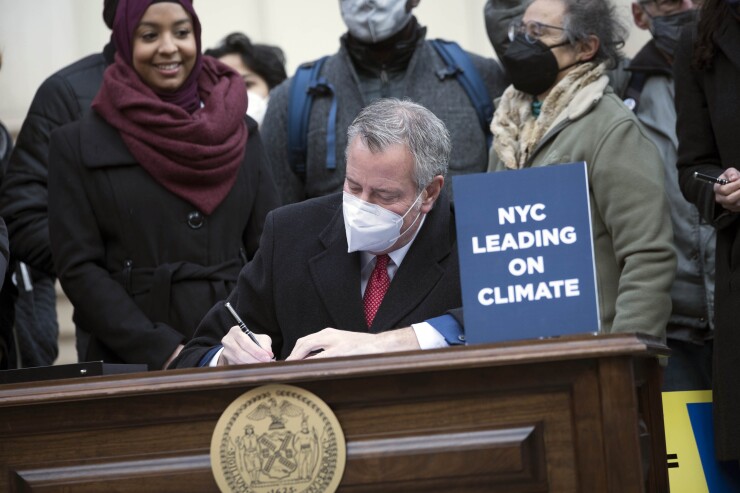Two New York City pension funds have successfully completed the divestment of securities related to fossil fuel companies, Mayor Bill de Blasio and Comptroller Scott Stringer announced Wednesday.
The Trustees of the New York City Employees’ Retirement System (NYCERS) and the Board of Education Retirement System (BERS) said the action brings their total divestment across all funds to an estimated $3 billion.
“Today is a major victory for our planet, our children, and our pensioners,” Stringer said in a statement. “The successful divestment of $3 billion out of fossil fuels is proof-positive that environmental and fiscal responsibility go hand in hand.”

The city has five pension funds.
So far, NYCERS and BERS have completed the process of
The divestment by the Teachers Retirement System’s (TRS) is currently underway, having divested over $1 billion so far. The funds' actions are expected to be completed in the first quarter of 2022 with around $1 billion remaining to be divested.
NYCERS, TRS and BERS represent 70% of the total assets of the city’s $267 billion pension funds.
The other two city funds are not involved in the divestment action: the Police Department and the Fire Department pension funds.
“This $3 billion divestment, along with our billions in investments in climate solutions, is accelerating our transition to a green and just economy and advancing a climate-friendly future for generations to come,” de Blasio said.
In January 2018, the trustees announced they wanted to divest from fossil fuel reserve firms within five years, an action they said was consistent with their fiduciary duty.
The systems hired independent investment consultants who studied the risks posed by fossil fuel companies. The divestment aims to address the significant financial and environmental risks that these fossil fuel holdings pose to the funds. Securities to be divested were identified based on demonstrated risk from fossil fuel reserves and business activity.
Since the 2018 announcement, hundreds of other municipal governments and entities have joined the city’s efforts.
In October, Stringer and the pension trustees announced a goal of achieving net zero greenhouse gas emissions in their investment portfolios by 2040. This includes a goal to double investments in climate change solutions, such as renewable energy and green real estate, to over $8 billion by 2025 and achieve over $37 billion in climate solutions investments by 2035 across the three funds.
“New York City is leading the way toward a clean, green and sustainable economy, and the impacts of the actions we are announcing today will be felt for generations to come,” Stringer said.
On Wednesday, de Blasio signed a law that mandates the phase-out of the use of fossil fuels in new buildings built in the city and accelerates the construction of all-electric buildings.
“New York City is proof that it’s possible to end the era of fossil fuels, invest in a sustainable future, protect public health, and create good paying jobs in the process,” de Blasio said.
The law sets restrictions on fossil fuel usage in newly constructed residential and commercial buildings by phasing in strict emissions limits beginning in 2023. Buildings of all sizes must be constructed to be fully electric by 2027.

“For me this is a very personal moment. This will be the last bill that I sign as mayor and I can't think of a better one,” de Blasio said.
De Blasio was term-limited out of office. Democrat Eric Adams won
Also on Wednesday, the four finalists were chosen in the city’s initiative to establish a global Center for Climate Solutions on Governors Island.
After receiving 12 proposals as part of a competitive process, de Blasio and the Trust for Governors Island said finalist teams include the City University of New York and the New School; the Massachusetts Institute of Technology; Northeastern University; and the State University of New York at Stony Brook.
The mayor also announced the city will make $420 million in investments to accelerate the timeline to achieve an all-electric municipal vehicle fleet. This includes the purchase of over 1,250 electric vehicles in 2022 and the installation of at least 1,776 fast chargers by 2030.
New York City is one of the largest issuers of municipal bonds in the country.
At of the end of the second quarter of fiscal 2021, the city had about $38.57 billion of general obligation debt outstanding, not counting the various city authorities that issue debt. The NYC Transitional Finance Authority has $41.64 billion of debt outstanding while the NYC Municipal Water Finance Authority has $31.12 billion of debt outstanding.
The city’s GOs are rated Aa2 by Moody’s Investors Service, AA by S&P Global Ratings, AA-minus by Fitch Ratings and AA-plus by Kroll Bond Rating Agency. All four assign stable outlooks.
Separately, the New York State Common Retirement Fund announced last week that it will invest $2 billion in an index focused on reducing the risks of climate change and capitalizing on the opportunities arising from the transition to a low-carbon economy.
State Comptroller Thomas DiNapoli, trustee of the fund, said it was part of the Climate Action Plan announced in 2019 with a goal of net-zero greenhouse gas emissions by 2040.
The fund will allocate $2 billion within its internally managed public equity portfolio to FTSE Russell's Russell 1000 TPI climate transition index in connection with the fund’s sustainable investment and climate solutions (SICS) program.
Earlier this year, DiNapoli announced $800 million in three new investments through the SICS program to which he has committed $20 billion. To date, the fund has allocated $15.3 billion of that overall commitment. This was the third passive domestic investment under the program.
The New York State Common Retirement Fund is the third largest public pension fund in the United States and has assets of about $255 billion.





